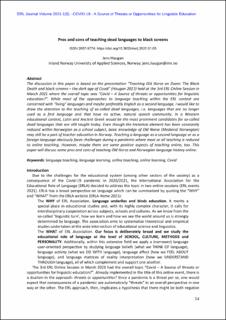Pros and cons of teaching dead languages to black screens
Peer reviewed, Journal article
Published version
Permanent lenke
https://hdl.handle.net/11250/2980944Utgivelsesdato
2021Metadata
Vis full innførselSamlinger
Sammendrag
The discussion in this paper is based on the presentation “Teaching Old Norse on Zoom: The Black Death and black screens – the dark age of Covid” (Haugan 2021) held at the 3rd ERL Online Session in March 2021 where the overall topic was “Covid – A Source of threats or opportunities for linguistic education?”. While most of the approaches to language teaching within the ERL context are concerned with “living” languages and maybe preferably English as a second language, I would like to draw the attention to the teaching of so-called dead languages, i.e. languages that are no longer used as a first language and that have no active, natural speech community. In a Western educational context, Latin and Ancient Greek would be the most prominent candidates for so-called dead languages that are still taught today. Even though the historical element has been constantly reduced within Norwegian as a school subject, basic knowledge of Old Norse (Medieval Norwegian) may still be a part of teacher education in Norway. Teaching a language as a second language or as a foreign language obviously faces challenges during a pandemic where most or all teaching is reduced to online teaching. However, maybe there are some positive aspects of teaching online, too. This paper will discuss some pros and cons of teaching Old Norse and Norwegian language history online.
Beskrivelse
ERL JOURNAL rests on the open access policy. Accordingly, it permits any users to read, download, copy, distribute, print, search, or link to the full texts of its texts (scholarly papers, reports, and reviews) and to use them for any other lawful purpose. Meant to serve a greater global exchange of knowledge on the key strata of education and language, ERL Journal strives to make its content easily available to readers around the world, who can use its texts without prior permission of the publisher as long as the original author and the texts’ source are acknowledged. All the texts published in ERL Journal are free to access immediately from the date of publication.
